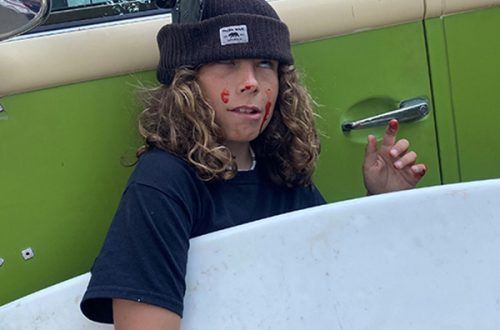A Focus on Mental Health for South County
By Suki Wessling

Luckily right now there’s a good amount of funding and will to make mental health a priority. For us, it’s one of those things that we knew could be beneficial, so this is an opportunity for us to do something we’ve always wanted to do, which is to make it more of a primary concern.
The pandemic hasn’t spared the southern half of Santa Cruz County, and no one has a wider view of this than professionals who work with families here.
“In PVUSD almost twenty percent of students have lost a family member or someone close to them,” says Eric Ochoa. “It’s just shocking when you hear the actual number.”
Ochoa has a unique perspective on the mental health of the students in Pajaro Valley. As Behavioral Health Director of the nonprofit agency Pajaro Valley Prevention and Student Assistance (PVPSA), Ochoa oversees a program that provides mental health services to every school in the Pajaro Valley Unified School District (PVUSD).Unlike the northern half of the county, which hosts numerous small school districts, PVUSD’s single district covers the southern half of the county as well as northern Monterey County. Although that structure presents its own challenges, it also allows an agency like PVPSA to provide a comprehensive program to support the mental health of South County students.
PVPSA was established specifically to provide services to PVUSD, including on-site therapists and social workers, drug and gang prevention training, and referrals to specialists.In acute cases, County Health can step in with its Mobile Emergency Response Team Youth (MERTY) service, which provides urgent crisis services to help stabilize youth. A new South County MERTY service was launched in April, further expanding youth mental health services in the area.
“By having the mobile team, MERTY is able to respond to the youth in the community in the MERTY behavioral health mobile office and provide services to the youth in crisis,” explains Cassandra Eslami, director of community engagement for Santa Cruz County Behavioral Health Services.What are the needs?
The pandemic has strained the usual modes of providing care to youth in crisis, at the same time as mental health has plummeted.“In mental health, we talk about how isolation is a necessary ingredient in all serious mental illness,” says Eric Ochoa. “To have people isolated on purpose and widely for a long period of time, you’re creating the conditions where it’s much more possible to have serious mental health problems. We’re experiencing higher levels of depression and anxiety, more suicides and suicidal clients than normal.”
During the school closures, PVPSA moved most of their services online, assigning students to counselors and therapists based on availability rather than location. They are in the process of shifting those services back to school sites, as well as developing a Wellness Center where students and families could seek a combination of services in one location.
Cassandra Eslami says that they are seeing similar challenges at the County level. “Symptoms that have been most prevalent among youth are increases in social anxiety, loss of motivation, increase in family & caregiver conflict, loss of identity and difficulty adapting to new environments.”
The County’s Behavioral Health team is also experiencing a flood of new cases as a result of the pandemic. “Some concerns regarding student mental health as they return to school full-time are increase in Child Protective Service (CPS) reporting, social anxiety, suicide ideation/attempts that were not reported, bullying, and capacity to adhere to a ‘normal’ school schedule,” Eslami predicts.
A problem exposed
Eric Ochoa says that the silver lining of the pandemic is that our society is finally paying attention to the lack of funding for mental health that had been a persistent
problem.
“Luckily right now there’s a good amount of funding and will to make mental health a priority. For us, it’s one of those things that we knew could be beneficial, so this is an opportunity for us to do something we’ve always wanted to do, which is to make it more of a primary concern.”
The South County MERTY is another example of new funding for mental health specifically suited to South County, which for years has had to wait for service to come from the north.“The MERTY team has extended experience in preparing for situations where there is family conflict, youth experiencing symptoms of psychosis, depression, anxiety, suicide ideation, and self-harming behaviors,” explains Eslami. “The team [tries] to stabilize the youth in the community by providing resources, safety planning, and as a last resort psychiatric hospitalization.”
On top of the increased calls for mental health support, Ochoa says that his agency is finding that you can’t separate the emotional and physical needs of their clients. “Especially in Watsonville, a lot of times there’s needs like shelter and food. We actually have staff that will bring food to people, find housing for people. We go beyond the therapy piece and give support for basic needs.”
PVPSA has also created a grant-funded program to support students whose families have insurance and are not eligible for Medi-Cal, but have high copays or no coverage for mental health treatments. Such concerns often keep families from seeking mental health care that could prevent a more complex crisis.
Parents can erase the stigma
Ochoa says that despite all the work that’s been done, the stigma of seeking help for mental health is still alive and well. And he says that the most important thing that parents can do is to support their children who seek help with their mental health.
“Let the kids know that this is a courageous and admirable act to ask for help and it’s going to be met with encouragement and support and not any kind of judgment or negative connotation,” he advises. “There’s still that perception that mental health is somehow different from dental health or physical health, where you have a professional working with you on it on an ongoing basis.“If you have your dental health in order people respect you. If you have your physical health in order people respect you. But for mental health there’s still some people that look at it like, ‘why are you getting help with that?’ We need to make sure that we’re not perpetuating that stigma.”
Suki Wessling is a local writer and teacher and the mother of two grown children. Read more at SukiWessling.com.








